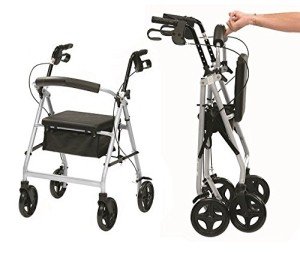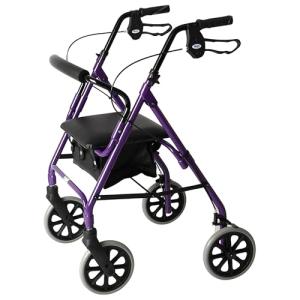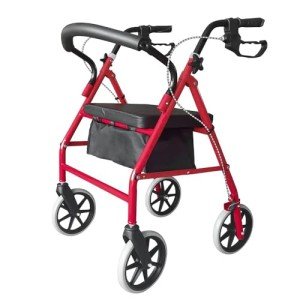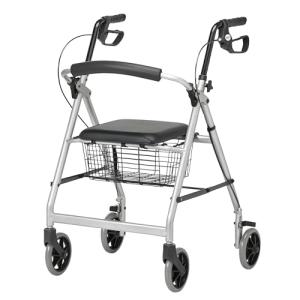As the global population ages and more people experience mobility challenges, the demand for assistive devices has surged. Among these devices, the lightweight folding rollator walker with a padded seat has emerged as a popular choice. This versatile mobility aid not only provides the necessary support for walking but also offers comfort and convenience. This guide explores the features, benefits, and considerations of using a lightweight folding rollator walker with a padded seat, aiming to provide comprehensive insights for potential users and their caregivers.
Understanding Rollator Walkers
A rollator walker is a walking aid designed for individuals who need assistance with balance and stability while walking. Unlike traditional walkers that require users to lift the device with each step, rollators feature wheels that allow for easy maneuverability. Many models are equipped with additional features, such as brakes, baskets, and padded seats, making them more practical for day-to-day use.
Key Features of Lightweight Folding Rollator Walkers
-
Lightweight Design: One of the most significant advantages of a lightweight rollator walker is its easy portability. Most models weigh between 12 to 20 pounds, making them easy to lift and transport. The lightweight design is especially beneficial for seniors or individuals recovering from surgery.
-
Folding Mechanism: The ability to fold the rollator allows for convenient storage and transport. Whether placing it in the trunk of a car or storing it in a small apartment, a folding rollator walker is space-efficient.
-
Padded Seat: Comfort is paramount for individuals using walkers, particularly during long outings. The padded seat provides a convenient resting place, allowing users to take breaks when needed without the worry of finding a bench or other seating.
-
Adjustable Height: Most lightweight folding rollator walkers come with adjustable handles, catering to users of varying heights. This feature ensures optimal posture and reduces strain on the back, neck, and wrists.
-
Braking System: Safety is a critical consideration for any mobility aid. Rollators typically feature easy-to-use hand brakes, allowing users to stop safely and securely. Locking brakes provide additional safety when seated.
-
Storage Options: Many rollator models feature baskets, trays, or bags that can carry personal items, groceries, and other essentials. This multifunctionality makes it easier and more convenient for the user to run errands or go for walks.
Benefits of Using a Lightweight Folding Rollator Walker
Using a lightweight folding rollator walker with a padded seat comes with numerous benefits:
-
Increased Independence: This mobility aid helps individuals maintain their independence by enabling them to walk comfortably and safely, facilitating a greater degree of freedom.
-
Enhanced Stability & Balance: With its sturdy frame and four sturdy wheels, users can feel more stable while walking, reducing the risk of falls.
-
Comfortable Resting: The padded seat offers a convenient resting point, allowing users to stop and take breaks without having to find additional seating.
-
Improved Posture: Adjustable handle heights help ensure that the user maintains proper posture while walking, potentially alleviating discomfort and preventing long-term spine issues.
-
Convenient Storage: The addition of storage baskets allows users to carry necessary items conveniently, making daily activities such as shopping significantly easier.
Choosing the Right Lightweight Folding Rollator Walker
When selecting a rollator walker, several factors should be considered:
-
Weight Capacity: Ensure the chosen walker supports the user's weight.
-
Wheel Size: Larger wheels offer better performance on uneven surfaces, while smaller wheels are easier to maneuver in tight spaces.
-
Seat Width: Choose a seat that provides enough space and comfort for the user.
-
Assembly Requirements: Some walkers come fully assembled, while others may require some setup. For those who may struggle with assembly, opt for a pre-assembled model.
-
Materials: Look for durable yet lightweight materials to ensure longevity and ease of use.
-
Braking System Type: Check if the braking system is intuitive and easy to use to ensure safety for the user.
Frequently Asked Questions (FAQs)
1. What is the average lifespan of a lightweight folding rollator walker?The average lifespan of a rollator walker is typically around 5 to 10 years, depending on usage and maintenance.
2. Can rollator walkers be used outdoors?Yes, many rollator walkers are designed for outdoor use, with larger wheels and robust frames that can handle various terrains.
3. Are there any maintenance tips for rollator walkers?Regularly check the brakes, wheels, and adjustable parts for wear and tear. Keep the frame clean and lubricate any moving parts as needed.
4. Can a rollator walker be used for post-surgery recovery?Yes, rollator walkers are often recommended for individuals recovering from surgery, as they provide stability and support during mobility.
5. Do insurance plans cover rollator walkers?Coverage varies by insurance provider and policy. It is advisable to check with individual plans for specific details regarding coverage for mobility aids.
The lightweight folding rollator walker with a padded seat represents a practical solution for individuals facing mobility challenges. With its blend of comfort, stability, and convenience, this assistive device allows users to maintain their independence and lead an active lifestyle. By considering the list of features and benefits discussed in this article, potential users can make informed decisions, ultimately enhancing their quality of life and mobility. Whether for personal use or caregiving purposes, a rollator walker can be a valuable investment in independence and well-being.






